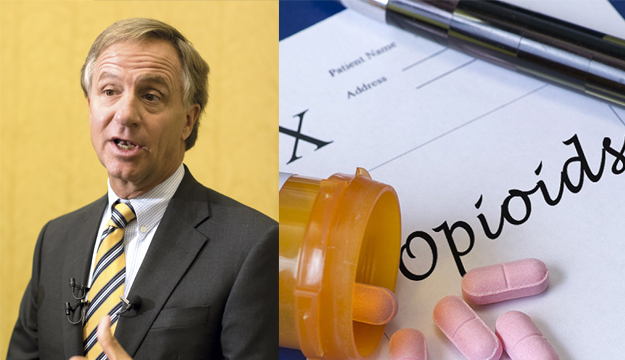Joined by leadership from the State House and Senate and Tennessee Chief Justice Jeff Bivins, Gov. Bill Haslam Monday announced what his office called, “an aggressive and comprehensive plan to end the opioid epidemic in Tennessee.” The plan centers on three major components: prevention, treatment and law enforcement.
TN Together is a multi-faceted initiative that addresses the issue of opioid addiction through legislation, proposed funding in the governor’s 2018-19 budget and executive actions. TN Together is a collective effort and has been designed in partnership with the General Assembly through the Ad Hoc Opioid Abuse Task Force established by Speaker Beth Harwell and chaired by Speaker Pro Tem Curtis Johnson and a working group established by Haslam that included Harwell and Lt. Gov. Randy McNally’s appointee, Speaker Pro Tem Ferrell Haile.
“This is a crisis that knows no boundaries and impacts many Tennesseans regardless of race, income, gender or age. Our approach will be aggressive with provisions to limit the supply of opioids and significant state and federal dollars to provide treatment to those in need,” Haslam said. “I applaud the collaboration and the considerable work of the House and Senate on the TN Together plan, as well as the judicial branch’s leadership through the Regional Judicial Opioid Initiative and National Opioid Task Force, and I ask all stakeholders around this issue to work together to achieve real reform and action that will save lives.”
Specifically, the plan includes:
• Legislation to address prevention by limiting the supply and the dosage of opioid prescriptions, with reasonable exception and an emphasis on new patients. Initial prescriptions will be limited to a five-day supply of drugs with daily dosage limits of 40 MME (morphine milligram equivalent).
• Limiting coverage for TennCare enrollees to an initial five-day supply with daily dosage limits.
• Increasing prevention education in grades K-12 through revisions to the state’s health education academic standards.
• An executive order, issued today, establishing a special commission to formulate current, evidenced-based pain and addiction medicine competencies for adoption by the state’s medical and health care practitioner schools.
• Identifying women of childbearing age who are chronic opioid users and providing targeted outreach about risks and treatment in order to aid in the prevention of Neonatal Abstinence Syndrome (NAS) births.
• Investing more than $25 million for treatment and recovery services for individuals with opioid use disorder. These services will include an increase in peer recovery specialists in targeted, high-need emergency departments to connect patients to treatment immediately.
• Improving the state’s data systems to better and more timely identify critical hot spots for targeting resources and increasing information about patient and community risks.
• Legislation that expands residential treatment and services for opioid dependence within the criminal justice system and creates incentives for offenders who complete intensive treatment programs while incarcerated – a best practice that is proven to reduce recidivism, improve lives and communities and save taxpayer dollars.
• Attacking the illicit sale and trafficking of opioids by providing additional resources to the Tennessee Bureau of Investigation for rapid response teams and, through legislation, penalizing the use and unlawful distribution of dangerous and addictive drugs, including those that mimic the effects of fentanyl, a drug that is up to 100 times more potent than morphine and is linked to an alarming number of overdose deaths.
• Providing every Tennessee state trooper with naloxone for the emergency treatment of opioid overdose.
The coming state budget proposal will include a $30 million investment (state and federal funds) to support TN Together.
More details on the TN Together plan, including help for those suffering from addiction and other resources, can be found at tn.gov/opioids.




